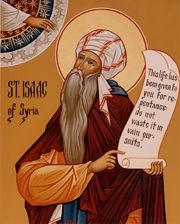Difference between revisions of "Isaac of Syria"
| Line 1: | Line 1: | ||
| − | '''Isaac of Syria''' is a 7th century [[saint]] known for his strict [[asceticism]]. He was born in the region of Qatar on the western shore of the Persian Gulf. When still quite young, he entered a [[monastery]] with his brother. He gained considerable renown as a teacher and was ordained [[bishop]] of Ninevah, the former capital of Assyria to the north, but requested to abdicate after only five months. He then went south to the wilderness of Mount Matout, a refuge for anchorites. There he lived in solitude for many years studying the [[Scripture]], but eventually blindness and old age forced him to retire to the monastery of Shabar, where he reposed and was buried. | + | [[Image:Isaac_of_Syria.jpg|right|Icon of St. Isaac of Syria]] '''Isaac of Syria''' is a 7th century [[saint]] known for his strict [[asceticism]]. He was born in the region of Qatar on the western shore of the Persian Gulf. When still quite young, he entered a [[monastery]] with his brother. He gained considerable renown as a teacher and was ordained [[bishop]] of Ninevah, the former capital of Assyria to the north, but requested to abdicate after only five months. He then went south to the wilderness of Mount Matout, a refuge for anchorites. There he lived in solitude for many years studying the [[Scripture]], but eventually blindness and old age forced him to retire to the monastery of Shabar, where he reposed and was buried. Feast day is [[January 28]]. Not to be confused with the other St. Isaac the Syrian, Abbot of Spoleto, who lived during the mid-sixth century ([[April 12]]). |
==Quotations== | ==Quotations== | ||
Revision as of 14:47, December 18, 2005
Isaac of Syria is a 7th century saint known for his strict asceticism. He was born in the region of Qatar on the western shore of the Persian Gulf. When still quite young, he entered a monastery with his brother. He gained considerable renown as a teacher and was ordained bishop of Ninevah, the former capital of Assyria to the north, but requested to abdicate after only five months. He then went south to the wilderness of Mount Matout, a refuge for anchorites. There he lived in solitude for many years studying the Scripture, but eventually blindness and old age forced him to retire to the monastery of Shabar, where he reposed and was buried. Feast day is January 28. Not to be confused with the other St. Isaac the Syrian, Abbot of Spoleto, who lived during the mid-sixth century (April 12).
Quotations
- "Be persecuted, rather than be a persecutor. Be crucified, rather than be a crucifier. Be treated unjustly, rather than treat anyone unjustly. Be oppressed, rather than zealous. Lay hold of goodness, rather than justice."
- —St. Isaac of Syria
- "A small but always persistent discipline is a great force; for a soft drop falling persistently, hollows out hard rock."
- —St. Isaac of Syria
Sources/external links
Categories > Church History
Categories > Church History
Categories > Church History
Categories > Church History
Categories > Church History
Categories > Liturgics > Feasts
Categories > Liturgics > Feasts
Categories > Liturgics > Feasts
Categories > Liturgics > Feasts
Categories > People > Clergy > Bishops
Categories > People > Clergy > Bishops > Bishops by century > 7th-century bishops
Categories > People > Monastics
Categories > People > Saints
Categories > People > Saints > Church Fathers
Categories > People > Saints > Saints by century > 7th-century saints
Categories > People > Saints > Syrian Saints
